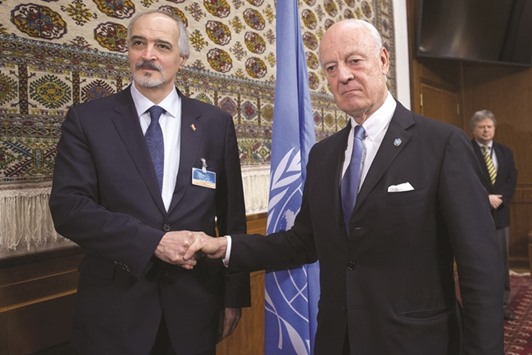A UN-led push to chart a way out of Syria’s tangled civil war got off to a shaky start yesterday, with only representatives of Bashar al-Assad’s regime attending the first day of supposed peace talks in Switzerland.
The main umbrella body representing the myriad opposition and rebel groups in the five-year-old conflict was refusing to take part at the start of what are meant to be six months of intra-Syrian negotiations in Geneva.
A member of this group, the High Negotiations Committee (HNC), told AFP however that a small, low-level team of three spokesmen were en route for Geneva where they might meet UN envoy Staffan de Mistura.
“The media delegation... might meet with de Mistura, with the Americans, but the programme is not clear yet,” Fuad Aliko said. “But not as negotiators.”
Neither de Mistura nor Syria’s UN ambassador Bashar al-Jaafari commented to reporters as they began discussions inside Geneva’s Palais des Nations, the European UN headquarters.
The talks, backed by all the external powers embroiled in the war, are the biggest push yet to end a conflict that has killed more than 260,000 people and facilitated the meteoric rise of the extremist Islamic State (IS) group.
The conflict has also forced millions of Syrians from their homes, many of them into neighbouring states and further afield, causing a major political headache for the European Union which received more than 1mn migrants in 2015.
De Mistura issued an emotional video message on Thursday to Syrians both inside and outside the country saying that after previous failures, this new effort “cannot fail”.
The Geneva negotiations, if they happen properly, would not be face-to-face between the regime and its opponents. Instead they are “proximity talks” where go-betweens shuttle between the different participants.
They are part of an ambitious plan launched in Vienna in November by a raft of key actors including Russia, the United States, Gulf states, Iran and Turkey that foresees elections within 18 months.
Despite Western pressure, the HNC umbrella group has been refusing to show up in Switzerland before an agreement is reached on aid reaching hundreds of thousands of people stuck in besieged towns.
The US State Department said on Thursday these demands were “legitimate” but called on the opposition to take part in what it called “an historic opportunity”.
“And we still believe they should do so without preconditions,” spokesman Mark Toner said. “We believe these demands, while legitimate, shouldn’t keep the talks from moving forward.”
The HNC, which engaged in a fourth day of talks in Riyadh on whether to attend, has also asked for “clarifications” after the UN issued invitations to other opposition figures.
De Mistura reportedly issued individual invitations to a list of figures opposed to the regime but who are thought to have closer ties to Moscow and have limited influence on the ground.
Randa Kassis, a member of that list, told AFP in Geneva yesterday that despite the uncertainty on who would attend, “something has to start. We have to think of the Syrian people.”
The HNC and its Saudi and Turkish backers have also objected to the participation of Syrian Kurdish groups that have made key advances against IS in northern Syria in recent months.
Russia, however, which has helped the regime of President Assad make inroads against rebels with air strikes since September, says Kurdish involvement is essential.
France-based Middle East analyst Agnes Levallois said the opposition was growing increasingly frustrated that the question of Assad’s fate, a key stumbling block in previous talks, was being put off.
“Assad is feeling stronger and stronger so is being inflexible,” she said.
Iranian President Hassan Rouhani, whose country also backs Assad, said during a visit to Paris on Thursday that the process would take time.
“We hope that these talks will succeed as soon as possible. But I would be surprised if they succeed very quickly because in Syria there are groups who are at war with the central government and also amongst themselves,” French media quoted him as saying.
“There is interference in the internal affairs of Syria,” he added.

Syrian ambassador to the UN and head of the government delegation Bashar al-Jaafari (left) shakes hands with UN envoy Staffan de Mistura at the opening of the talks in Geneva yesterday.
